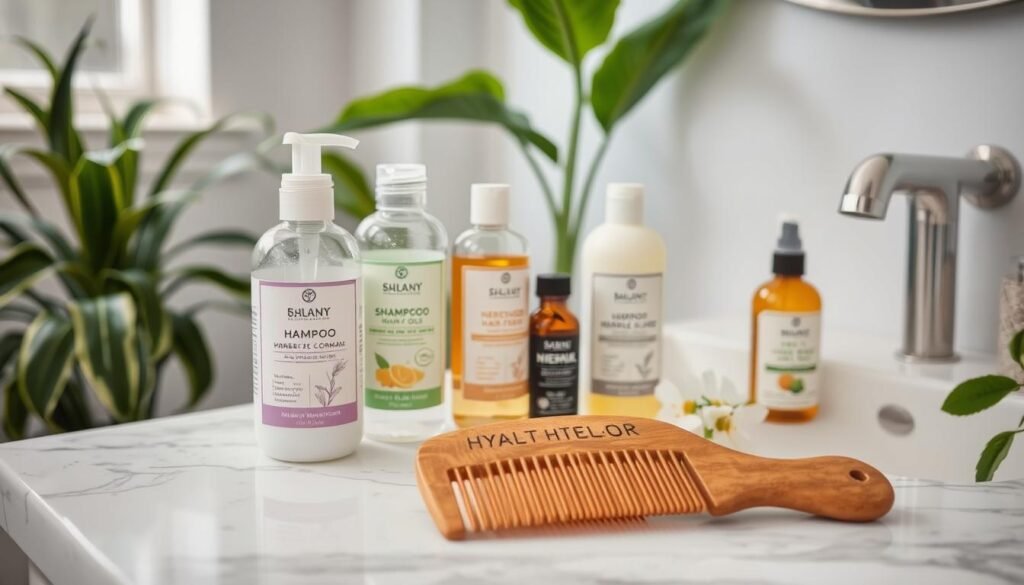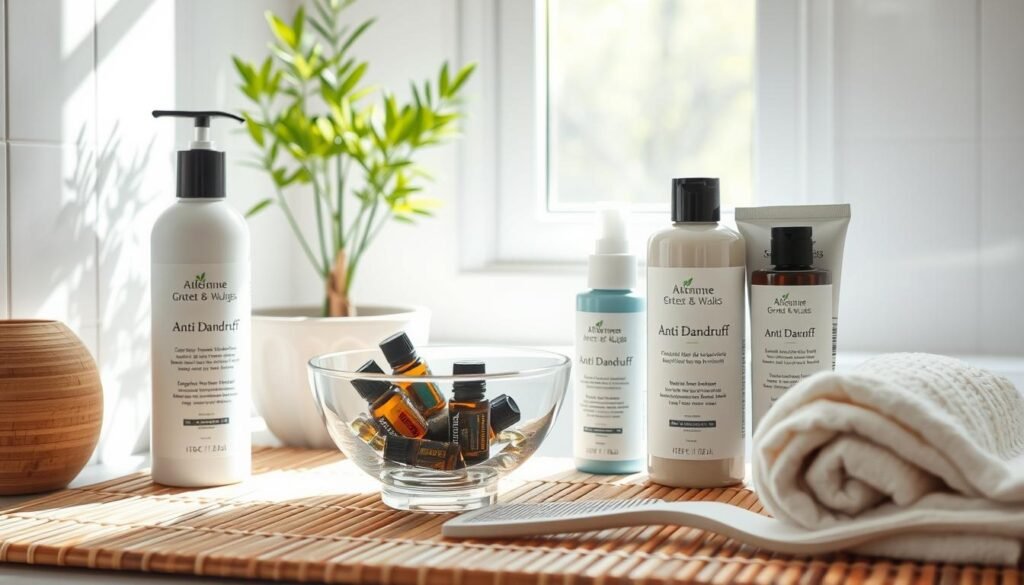Over half of adults deal with dandruff at some time in their lives. It’s common but can make you feel embarrassed and uncomfortable. You don’t always need costly treatments or strong chemicals to fight it. Often, just changing a few daily habits can make a big difference. Understanding how your everyday choices affect your scalp is key. This knowledge can help you find effective dandruff solutions and achieve a healthier scalp.
Simple life changes can tackle those annoying flakes and bring relief. We will look at how altering your lifestyle can improve scalp health. These changes can help your scalp feel better and boost your overall health too.
Key Takeaways
- Over 50% of adults experience dandruff, highlighting its prevalence.
- Simple lifestyle adjustments can significantly improve scalp health.
- Nutrition plays a vital role in achieving effective dandruff relief.
- Managing stress can positively affect scalp conditions.
- Daily choices are critical for fostering a healthier scalp environment.
Understanding Dandruff: Causes and Symptoms
Dandruff is a common issue where skin on the scalp flakes off. It’s both distracting and annoying. Understanding it starts with knowing the root causes. One main cause is too many skin cells on the scalp. These extra cells shed and become visible flakes.
Sensitivity to certain hair products can also cause dandruff. Likewise, a yeast-like fungus called Malassezia upsets the scalp’s balance. This leads to more flaking and irritation.
The symptoms of dandruff can change from person to person. Common signs include:
- Flakes in the hair and on shoulders.
- Itchiness on the scalp.
- Redness or inflammation, in some cases.
Knowing the causes and symptoms is key to managing dandruff. Recognizing them helps guide to effective treatments and changes in care. A thorough approach, including right hair care and maybe seeing a dermatologist, improves control over dandruff.
For deeper insights on diagnosis and treatments, check out this informative link.
Environmental Factors Causing Dandruff
Dandruff may get worse due to different environmental factors causing dandruff. These factors greatly affect someone’s surroundings. It’s crucial to know what makes dandruff flare up. Cold seasons like winter dry out the scalp, causing flakes to appear. This is because of low humidity, which takes away skin moisture.
Air pollution is also a big problem. Being around particles and chemicals in the air can irritate the scalp. This irritation could lead to more dandruff. Also, indoor heaters make the air hot and dry, making the scalp even drier.
Finding out what in your environment affects your dandruff is important for relief. Knowing about scalp irritants and changing your habits can improve your scalp’s health. Use humidifiers in the cold months or lower your heater’s temperature to keep your scalp moist. For more tips on handling dandruff, check this informative article.
| Environmental Factor | Impact on Scalp |
|---|---|
| Cold Weather | Dries out the scalp, leading to flaking |
| Low Humidity | Strips moisture, exacerbating dandruff issues |
| Pollution | Causes inflammation and aggravated itchiness |
| Indoor Heating | Circulates dry air, increasing dryness and irritation |
Lifestyle Adjustments for Dandruff
Effectively managing dandruff means making smart lifestyle changes. Focus on routines that make your scalp healthier. Regular scalp care is key to this process.
Incorporating Regular Scalp Care
Gentle exfoliation removes dead skin and supports hair growth. Moisturizing masks hydrate the scalp, fighting dryness. Building a routine with these steps leads to healthier hair.
Experts suggest adopting these care strategies. They help reduce flaky patches and boost overall scalp health.
Choosing the Right Hair Products
Choosing the right products is crucial in fighting dandruff. Pick shampoos and conditioners made for dandruff control. Look for ingredients like pyrithione zinc or tea tree oil that combat dandruff.
Avoid harsh chemicals that can harm your scalp. The right product supports a healthy scalp balance.

For more tips on battling dandruff, check out the guide on lifestyle changes for relief.
Nutritional Support for Dandruff Control
A healthy scalp is crucial for dandruff management. Essential nutrients play a key part, as they help lessen dryness and flakiness. This keeps your scalp in top condition.
Essential Nutrients for Scalp Health
Adding certain nutrients to your diet is helpful.
- Omega-3 fatty acids, in salmon and flaxseeds, nourish the skin well.
- Zinc, in nuts and seeds, boosts the immune system. It might aid in dandruff control.
- B vitamins, in leafy greens, improve skin health.
Knowing how to get these essential nutrients is key. A balanced diet is crucial for Nutritional Support for Dandruff Control.
Hydration: The Key to Healthy Skin
Don’t forget about hydration. Drinking enough water is vital for skin health. It keeps the scalp moist. This helps maintain a natural skin barrier, reducing itchiness and irritation linked to dandruff. Adding fruits and vegetables to your diet can boost hydration too. Understanding hydration’s role is important for scalp health.
For a better diet, consider dietary changes that nurture a healthy scalp.
Stress Management for Healthy Scalp
Feeling overwhelmed can really affect our scalp’s health. Too much stress might make more oil and inflammation, causing dandruff. Using good stress management techniques can help your scalp stay healthy.
Practices like mindfulness and yoga are great for lowering stress. They help you relax which is good for your scalp. Also, it’s important to keep your life and work in balance. Making simple changes, like setting limits and taking time for yourself, really helps.
Here are easy ways to make stress management part of your day:
- Allocate time for meditation or deep-breathing exercises.
- Engage in regular physical activities, such as walking or yoga.
- Establish a consistent sleep schedule to ensure restfulness.
- Practice gratitude journaling to focus on positive aspects of life.
Trying these steps can help lower stress and improve your scalp’s health. Managing stress well can boost your overall health and keep your scalp happier.
Anti-Dandruff Haircare Routine
An effective anti-dandruff haircare routine is key for a healthy scalp. Focusing on how you wash and dry can really lessen dandruff. These steps can boost overall scalp health.
Washing Techniques that Help
Good washing techniques are vital in fighting dandruff. It’s helpful to massage the scalp gently with your fingertips while shampooing. This cleans the hair and boosts circulation, helping hair grow healthier. Choose a mild anti-dandruff shampoo to tackle the root problem of dandruff better.
Drying Tips to Minimize Flakes
How you dry your hair matters as much as how you wash it. Air drying is best to cut down on scalp irritation and flakes. If you must use heat, pick a low setting to avoid scalp damage. Gently patting your hair dry with a soft towel, rather than rubbing, also supports scalp health.

Grooming Habits to Reduce Dandruff
Good grooming habits are key in fighting dandruff and keeping a healthy scalp. One important step is to regularly clean your hairbrushes. Doing so removes oils, dead skin, and product residue that might irritate the scalp.
Using hair accessories that are kind to your scalp is smart. Stay away from tight hairstyles that strain your scalp. Letting your hair loose helps keep your scalp happy.
Gently brushing your hair can also help. It spreads natural oils and boosts blood flow in the scalp. Choose wide-toothed combs to cut down on damage and irritation. Being regular with these grooming tips can lessen dandruff and make your scalp feel better.
To learn more about dandruff and lifestyle changes, visit this link on Grooming Habits to Reduce Dandruff. Knowing how these habits impact scalp health can improve how you deal with dandruff.
Seasonal Dandruff Prevention Tips
Changes in seasons can impact your scalp and health. Seasonal Dandruff Prevention Tips suggest different hair care routines for each season. In winter, dry air and heating can dry out your scalp, raising the risk of dandruff. Using moisturizing products like leave-in conditioners and hydrating masks helps.
Warmer months see more humidity, making scalps oily. Use lighter products to control oil without removing all moisture. An occasional clarifying shampoo can help remove buildup and dirt.
Protective hairstyles are key in cold weather. They keep moisture in. Try braids or buns to protect hair and keep it moist. When it gets warmer, choose styles that let your scalp breathe and prevent clogged pores.
| Season | Key Tips | Recommended Products |
|---|---|---|
| Winter |
|
|
| Summer |
|
|
Our aim is to keep a healthy scalp all year. Knowing each season’s needs can help reduce dandruff.
Conclusion
Lifestyle changes are key to managing dandruff effectively. By caring for the scalp regularly, choosing the right hair products, and eating well, one can improve scalp health. Stress reduction and a good haircare routine are also very important.
Adopting these strategies means taking action to improve scalp health. It’s important to keep up these habits for the best results. In the end, knowing what causes dandruff and making lifestyle changes can really make a difference. It leads to a healthier, flake-free scalp.